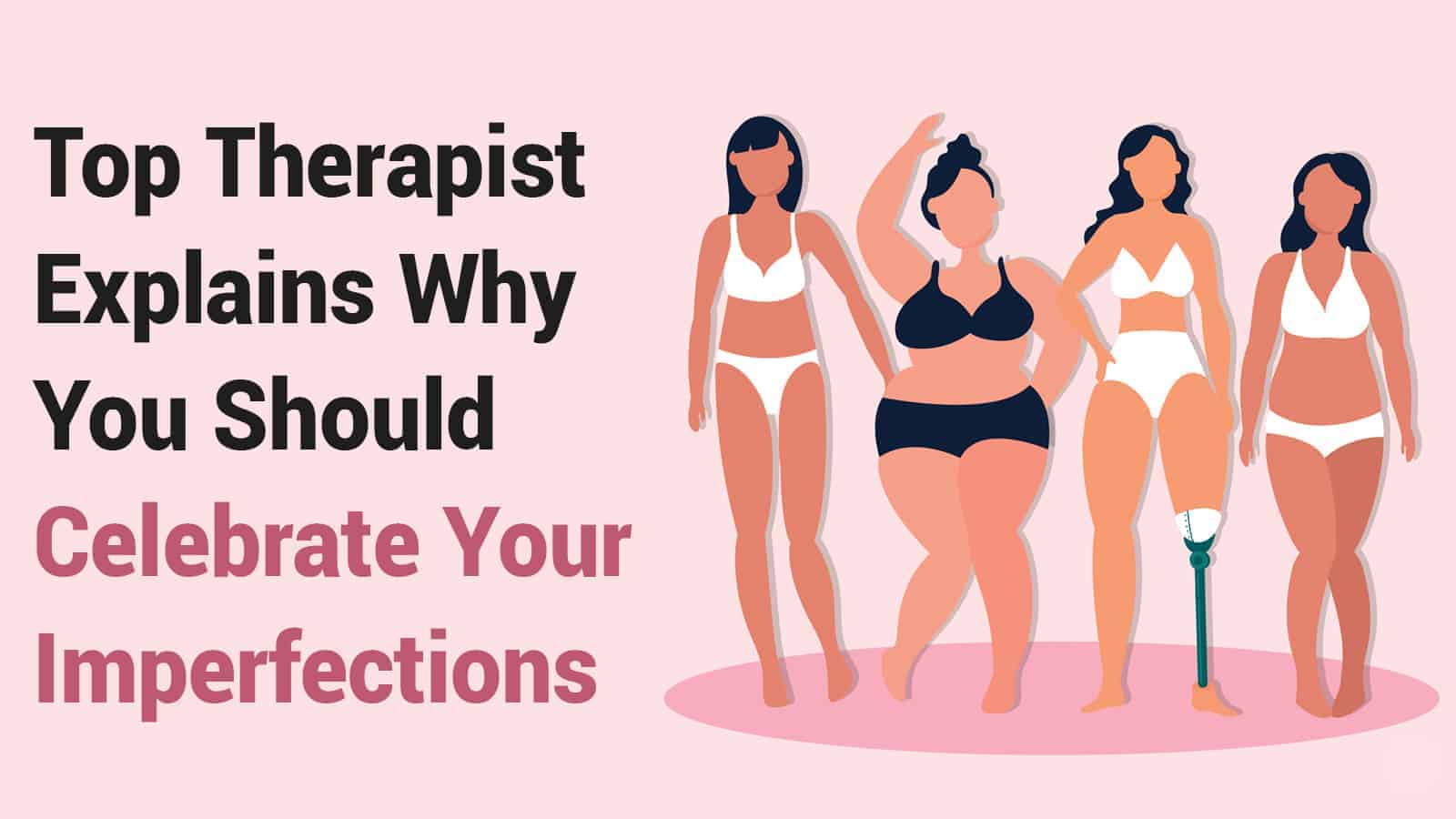So many people feel stressed about their imperfections. It’s a behavior that has been pushed since the dawn of civilization. In fact, people desire so much to be perfect that they may do bizarre things to achieve this desire.
It can be stressful to try to live up to perfection. Even if you enjoy being perfect or striving to be perfect, it can still bring on a lot of stress. It’s not healthy to live this way.
This leaves one to wonder. If it’s so unhealthy to try to be perfect all the time, why do you do it? You may be unaware of how much you’re hurting yourself with this desire to meet impossibly high standards.
As crazy as it sounds, you may need to aim lower. Here is why.
To Be Human is to Be Flawed
 As California therapist Sharon Martin, LCSW wrote, “everyone has flaws and makes mistakes.” In her article, Embrace Your Imperfections, she points out many ways in which people are flawed and why you shouldn’t be concerned about these flaws.
As California therapist Sharon Martin, LCSW wrote, “everyone has flaws and makes mistakes.” In her article, Embrace Your Imperfections, she points out many ways in which people are flawed and why you shouldn’t be concerned about these flaws.
People are late all the time. They may eat out too much and not exercise enough. Sometimes people are too mean and other times they’re too nice.
Sometimes people get lazy and ignore their responsibilities. While all of this is frowned upon, Dr. Martin points out that it’s perfectly normal to make mistakes and to be flawed. Therefore, you shouldn’t beat yourself up about it.
When you think about it, mistakes are mistakes and you should learn from them, but flaws are only flaws because someone said they are. These flaws become taboo because of expectations that society has created to make people fit in and stay in line.
This doesn’t mean you should become a rebel. However, you should realize that you feel flawed because you’re comparing yourself to others who you think are not flawed. Dr. Martin said that looking outward at people makes you think that they have it all together, but you aren’t getting the full story.
One great point that Dr. Martin made in her article was that you don’t hold others to the high standards that you hold yourself to. If you did, you may begin seeing little cracks in the façade of their perfect life.
What is the Definition of Perfect, Really?
It’s normal to be less than perfect. In fact, when you think about it, it’s hard to even define what makes a person perfect because we’re all different. That would mean that only one person on earth is perfect.
Every human being on the earth is unique – even identical twins have differences. Who’s to say that one person is perfect and the other isn’t? Does it make sense that one person out of a global population of over 7.8 billion people is the only perfect person on the planet?
The definition of perfection started being shaped the minute you were born. “In childhood, many of us learn that we need to be perfect—that we have to look a particular way, act a particular way, and meet other people’s expectations even at the expense of our own wellbeing,” says Dr. Martin,”…and our childhood experiences often plant the seeds of perfectionism, giving us the message that we’re not good enough as we are.”
As Dr. Martin is pointing out, perfection is simply a perception. It’s one that someone – your parents, your teachers, your neighbors, celebrities on television, the President – embedded in your brain. Perfection is more idealistic than anything; it’s society’s expectations of you.
You grew up not wanting to disappoint society. You’re taught to do your best, be your best, put your best foot forward. There is nothing wrong with striving to be your best but striving for some unattainable concept of perfection will leave you disappointed every time.
Five Tips to Help You Embrace Being Less Than Perfect
Hopefully, you’ve now realized that perfection isn’t real which means that imperfections aren’t real either, at least not in the sense that they are a flaw. Maybe you aren’t like everyone else and maybe you don’t have it all together like you think your idol does. In fact, your idol may be surprised that you think they’re perfect because they have the same misconceptions about perfection that you do.
The things that you consider as imperfections…you should embrace those things. That’s who you are and that’s quite alright. You should never feel like you aren’t good enough for being yourself.
In her article, Dr. Martin gives one of the best reasons you should embrace your imperfections. They make you an authentic person.
Authentic people connect better with others. No one wants to connect with a person that is fake and is a liar. People can tell when you’re pretending and, since no one is perfect, you would be pretending if you come off as perfect.
Authenticity means being able to admit that you have struggles and concerns in life. By doing this, you can help other people. Some people need to know they aren’t alone in their struggles – that it’s normal to have these issues. You could be an inspiration to someone simply by being authentic.
This doesn’t mean that you can’t aim to do better. It’s always good to recognize that you may not be your best self at the moment so that you can improve yourself. However, at no point during this process should you feel like a flawed or imperfect individual.
When you embrace your imperfections, you’ll find that you are a better and more whole person. You’ll be happier and more relatable which is much better than being some fictitious, perfect drone.
 How to Embrace Your Imperfections
How to Embrace Your Imperfections
It’s not always easy to embrace your flaws, especially if you’ve spent a lifetime pretending that you don’t have them. However, with some practice, you can learn to accept yourself just as you are. Here are a few tips that will help you begin to accept your flaws.
1. Start looking at your flaws differently.
This is the first step to acceptance. Realize that your flaws aren’t flaws! Call them what you want – quirks, character traits, etc., but realize that there is nothing wrong with these parts of you. It’s okay to look at areas of yourself as areas that need to be improved but let go of the notion that these areas are wrong or bad.
2. Take care of yourself.
Unfortunately, it can be too easy to slip into a routine of not taking care of yourself when you’re stressed about flaws. You may begin to think that there is no point in taking care of yourself because things aren’t getting better anyway.
This is the wrong way to think. When you look and feel your best, it’s much easier to accept yourself for who you are. Therefore, no matter how hard it may be, make it a habit to always take care of your health and your appearance.
3. Remember that your thoughts are just thoughts.
Sometimes people get caught up in negative thoughts. Let’s face it – we all have negative thoughts from time to time. However, it’s important to realize that these are just thoughts, not necessarily reality.
You probably won’t stop having negative thoughts (although you can practice having less of them), so you need to learn to have the thought then push it out of your mind. Having affirmations around you can help with this. Put them directly in your line of sight and refer to them when you’re having negative thoughts.
4. Stop being self-critical.
Remember that you are your own worst critic. The way you see yourself is usually not the way others see you. You may criticize things about yourself that others have never even thought about.
This doesn’t mean you should live your life according to what others think about you. This means that you should stop worrying about all the things you think are wrong with you. Focus on the positive; focus on what you can do instead of what you can’t.
5. Set realistic goals and expectations.
There is nothing wrong with wanting to improve areas that you’re lacking in, but you need to be realistic about what you can do.
An example is comparing yourself to your idol or a celebrity. Vowing to look like a celebrity in six months is likely not feasible; in fact, that celebrity probably doesn’t even look like what you see in the media. They wear tons of makeup, use plastic surgeons, wear slimming clothing, and have their photos photoshopped.
Your looks aren’t the only area in which you should have realistic expectations. Other areas are your education, career, love life, family life, religion, and more. Stop placing so much pressure on yourself to be perfect and improve yourself little by little. Your goals need to be smart and attainable so you don’t set yourself up for failure from the beginning.
 Final Thoughts About Learning to Love Your Imperfections
Final Thoughts About Learning to Love Your Imperfections
Dr. Martin’s article highlights how today’s society makes it much too easy to obsess over your flaws. Standards of living seem to keep going up making it a struggle to meet those expectations. However, you must resist the urge to be perfect because perfection is simply a façade.
Embracing your imperfections is the only way to bring some peace to your life. Realize that you don’t have to be perfect because no one is perfect. It’s okay to have flaws.
Above all, love yourself and take care of yourself. This will help you feel good and stay positive, and eventually, you’ll find it easier to accept yourself just the way you are.

















